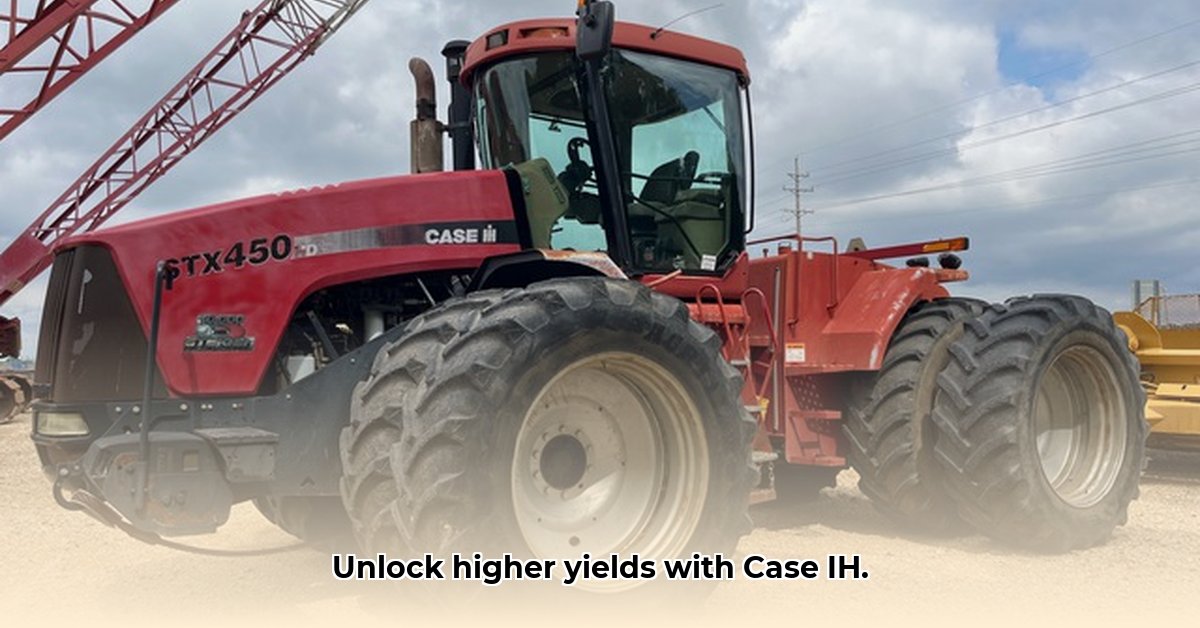
Case IH Steiger Series: A Sustainability Assessment
The Case IH Steiger Series articulating tractors represent a significant advancement in agricultural machinery, offering farmers increased power and efficiency. However, the growing emphasis on sustainable agricultural practices necessitates a comprehensive evaluation of their environmental impact. This article analyzes the Steiger Series' sustainability performance, considering fuel efficiency, precision technologies, environmental implications, data security, and proposing actionable recommendations for farmers, Case IH, policymakers, and researchers. For more information on Case IH tractor specifications, see Case IH Specs.
Fuel Efficiency and Precision Technology: Optimizing Resource Use
The Steiger Series boasts notable fuel efficiency improvements. Case IH reports approximately a 2% increase in fuel economy compared to previous models. While seemingly modest, this translates to substantial cost savings and reduced carbon emissions for large-scale operations. This improvement stems from enhanced engine responsiveness (a 50% increase) and operation at lower RPMs due to increased hydraulic flow.
Furthermore, integrated precision farming technologies, such as FieldOps™ telematics, significantly contribute to reduced fuel consumption. By providing real-time data on tractor performance and agronomic factors, FieldOps™ enables precise input management, minimizing overlaps and waste of fuel, fertilizer, and pesticides. This data-driven approach optimizes resource use, leading to both economic and environmental benefits. Isn't maximizing efficiency while minimizing environmental impact the ultimate goal of sustainable agriculture?
Environmental Impact and Limitations: A Balanced Perspective
While the Steiger Series offers improved fuel efficiency and precision capabilities, it's crucial to acknowledge potential negative environmental impacts. The significant weight of these tractors contributes to soil compaction, potentially affecting soil health and long-term crop yields. Have we considered the cumulative effect of countless passes with these heavy machines? The need for comprehensive life-cycle assessments (LCAs) remains critical to fully understand the long-term environmental consequences of the tractors’ manufacturing, operation, and disposal. Only a complete LCA can provide a truly balanced perspective.
Data Security and Privacy Concerns: Protecting Sensitive Information
FieldOps™ and similar technologies collect substantial data, raising vital concerns about data security and privacy. While this data enhances operational efficiency, ensuring its protection from unauthorized access is paramount. What measures are in place to prevent data breaches and safeguard sensitive farmer information? Robust cybersecurity protocols and transparent data-handling practices are essential to maintain farmer trust and ensure responsible data usage. This challenge demands continued dialogue among farmers, Case IH, and policymakers to establish adequate security measures and data privacy regulations.
Actionable Recommendations: A Multi-Stakeholder Approach
Addressing the sustainability challenges associated with the Steiger Series requires a collaborative effort. The following recommendations offer actionable steps for various stakeholders:
For Farmers:
- Implement controlled traffic farming (CTF) to minimize soil compaction. (CTF reduces the number of wheel tracks across the field, concentrating them into a smaller area).
- Maintain optimal tire inflation to reduce ground pressure.
- Utilize precision technologies like FieldOps™ to optimize input use and minimize passes.
- Adopt conservation tillage practices to improve soil structure and reduce compaction.
- Regularly assess soil health indicators, including compaction levels, to guide management decisions.
For Case IH:
- Invest in research and development to create lighter-weight tractors with improved ground pressure distribution.
- Conduct comprehensive LCAs to analyze the environmental impact of the entire product lifecycle.
- Develop and implement robust cybersecurity protocols for FieldOps™ and other data collection systems.
- Provide comprehensive training to farmers on best practices for minimizing compaction and maximizing the benefits of precision technology.
For Policymakers:
- Develop and implement incentives, such as subsidies or tax breaks, to promote the adoption of sustainable soil management practices.
- Fund research into innovative technologies for mitigating soil compaction and improving agricultural sustainability.
- Establish clear regulations regarding data privacy and security in agricultural technology.
For Researchers:
- Conduct comprehensive LCAs on agricultural machinery to quantify their environmental impact throughout their lifecycles.
- Develop tools to accurately assess and quantify soil compaction in different soil types and under various farming conditions.
- Investigate alternative fuels and energy sources for agricultural machinery to reduce reliance on fossil fuels.
Conclusion: A Path Toward Sustainable Agriculture
The Case IH Steiger Series tractors offer farmers significant advancements in power and efficiency. However, achieving true sustainability requires a multi-pronged approach that addresses both the benefits and limitations of these powerful machines. By implementing the recommendations outlined above and fostering continued research and collaboration, we can work towards a future where increased agricultural productivity coexists with environmental responsibility. The journey toward a sustainable agricultural future is an ongoing one; continued commitment and innovation are vital to this pursuit.